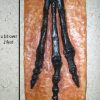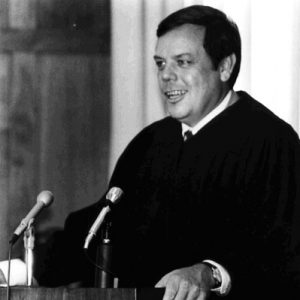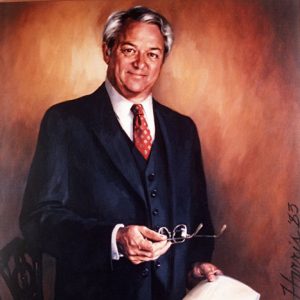calsfoundation@cals.org
McLean v. Arkansas Board of Education
The 1981–82 federal court case McLean v. Arkansas Board of Education constituted a challenge to the state’s Act 590, which mandated the equal treatment of creation science in classrooms where evolution was taught. On January 5, 1982, U.S. District Court Judge William R. Overton ruled Act 590 unconstitutional in light of the establishment clause of the First Amendment. His determination that creationism constituted a religious doctrine rather than a scientific theory had a profound impact on the nation, the ramifications of which are still being felt today.
The draft of the model act which eventually became Act 590 originated in an Anderson, South Carolina, organization called Citizens for Fairness in Education. Its founder, Paul Ellwanger, working from a model prepared by Wendell Bird of San Diego’s Institute for Creation Research, wrote a draft for a state act mandating the teaching of creationism alongside evolutionary theory and distributed it to various people across the country. One recipient was State Senator James L. Holsted of North Little Rock (Pulaski County), who introduced the act into the Arkansas Senate, where it passed without hearings on March 13, 1981. The House of Representatives held no hearings either, debating the bill for only fifteen minutes before passing it by a vote of 69–18. Governor Frank White signed it into law on March 19, 1981.
The bill’s passage resulted in a great deal of public outrage, with many state newspapers, universities, and the Arkansas Academy of Science arguing against it. A few legislators, embarrassed at letting such a bill pass, talked of repealing the law, but that would have required the cooperation of Governor White, who refused to consider it. Therefore, the challenge to the law moved to the courts, with the trial contesting its constitutionality beginning in December 1981.
The American Civil Liberties Union (ACLU) lined up twenty-three plaintiffs to challenge the law, twelve of whom were themselves clergy representing Methodist, Episcopal, African Methodist Episcopal, Catholic, Southern Baptist, Reform Jewish, and Presbyterian groups. The inclusion of such individuals as plaintiffs was to counter the rhetoric of the Moral Majority and other fundamentalist groups who saw McLean v. Arkansas as representative of a larger, national struggle between atheism and Christianity. In addition, a number of teachers’ associations signed on as organizational plaintiffs.
For the trial billed as “Scopes II” by the media, the ACLU divided its ten expert witnesses into two teams. The “religious team” argued that “historically, philosophically, and sociologically, creationism is a religious movement of fundamentalists who base their beliefs on the inerrancy of the Bible and that creation science is no more than religious apologetics,” according to witness and Cornell University sociologist Dorothy Nelkin. The “scientific team,” which included such luminaries as Stephen Jay Gould, presented arguments undercutting the supposed scientific basis for creationism. Thus, the plaintiffs sought to demonstrate that creationism was in fact a religious doctrine, the teaching of which violated the establishment clause.
By all accounts, witnesses for the defense performed rather poorly in contrast. The state’s goal was two-fold: a) to argue that the theory of evolution was itself religious in nature and that to teach it violated the establishment clause, and b) to present scientific evidence proving the theoretical validity of creationism. Judge Overton confronted the logic of the former, writing in his opinion: “Assuming for the purposes of argument, however, that evolution is a religion or religious tenet, the remedy is to stop the teaching of evolution, not to establish another religion in opposition to it.”
Many of the state’s witnesses also seemed to undermine the supposed scientific proofs of creationism. Norman Geisler rather embarrassed the state when he admitted under cross-examination his belief in UFOs as a satanic manifestation, while Harold Coffin noted that only with scripture as an aid could scientists understand the young age of the earth.
When Judge Overton ruled against the constitutionality of Act 590, he took particular issue with Section 4(a) of the act, which defined creation science as positing the “creation of the universe, energy, and life from nothing,” as well as explaining the earth’s geology “by occurrence of a worldwide flood.” Such a definition, he argued, violated the establishment clause due to its naked references to events in the Book of Genesis. The state did not appeal the case. However, many creationist groups today, recalling this ruling, work to press their ideas into the classroom under the guise of Intelligent Design Theory, which posits an anonymous, supernatural creator now stripped of confessional markers. Thus does McLean v. Arkansas continue to affect public policy today.
For additional information:
Beckwith, Francis J. “Science and Religion Twenty Years after McLean v. Arkansas: Evolution, Public Education, and the New Challenge of Intelligent Design.” Harvard Journal of Law and Public Policy 26 (Spring 2003): 455–490.
Creation Science Papers. Special Collections. University of Arkansas Libraries, Fayetteville, Arkansas.
La Follette, Marcel C., ed. Creationism, Science, and the Law: The Arkansas Case. Cambridge, MA: The MIT Press, 1983.
Lancaster, Guy. “‘This Evolution Bit is Straight from Satan’: McLean v. Arkansas Board of Education and the Democratization of Southern Christianity.” Religion & Education 33 (Fall 2006): 69–89.
Larson, Edward J. Trial and Error: The American Controversy over Creation and Evolution. Updated edition. New York: Oxford University Press, 1989.
Lyons, Gene. “Repealing the Enlightenment.” Harper’s Magazine, April 1982, pp. 38–40, 73–78.
Mackenzie, Jim. “How Biology Teachers Can Respond to Intelligent Design.” Cambridge Journal of Education 40 (March 2010): 53–67.
McLean v. Arkansas Documentation Project. http://www.antievolution.org/projects/mclean/new_site/index.htm (accessed July 28, 2023).
NcNair, Matthew R. “Another Brick in the Wall: The Rhetoric of Creationism, Science, and Education, and the Fate of the Establishment Clause in the American Classroom.” MA thesis, University of Arkansas, 2008.
———. “Rhetorical Continuity: Evolution, Creation Science, and Intelligent Design.” In First Amendment Studies in Arkansas: The Richard S. Arnold Prize Essays, edited by Stephen A. Smith. Fayetteville: University of Arkansas Press, 2016.
Moore, Randy. Evolution in the Courtroom: A Reference Guide. Santa Barbara, CA: ABC-CLIO, 2002.
Nelkin, Dorothy. The Creation Controversy: Science or Scripture in the Schools. New York: Beacon Press, 1982.
Ruse, Michael. Reading Ruse: Michael Ruse on Darwinism, Science, and Faith. Eugene, OR: Cascade Books, 2024.
Staff of the CALS Encyclopedia of Arkansas
 Clark, John Steven (Steve)
Clark, John Steven (Steve) Education, Elementary and Secondary
Education, Elementary and Secondary Epperson v. Arkansas
Epperson v. Arkansas Law
Law Religion
Religion Science and Technology
Science and Technology William Overton
William Overton  Frank White
Frank White 



Comments
No comments on this entry yet.